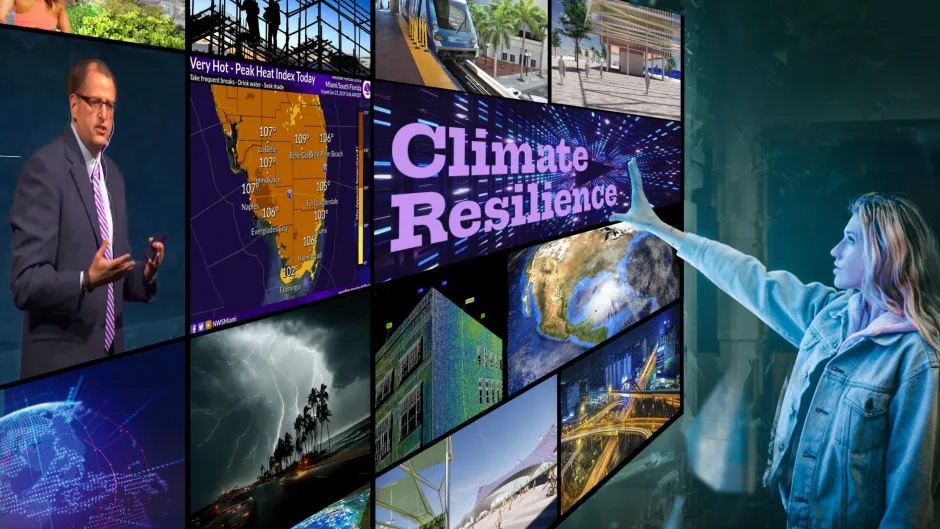University of Miami climate scientist Ben Kirtman imagines a future where cities and scientists will collaborate to interpret data from sensors throughout their municipalities. This information could allow scientists to predict and project risks for stressors like heat waves and flooding at the neighborhood and street level, so city leaders could then alert the residents who may need to take precautionary measures.
“Smart cities already have a lot of technology to observe things like traffic flow and street lighting, and all that instrumentation should include weather information,” said Kirtman, who creates climate models that are used to guide national forecasts as a professor of atmospheric sciences at the Rosenstiel School of Marine, Atmospheric, and Earth Science. “In places like South Florida, we really need to be able to provide information at the neighborhood level, but our current climate modeling efforts don’t meet that need. For example, one of the biggest problems of predicting flood risk is we don’t have widespread sensors to capture the potential measurement of a flood event, but we could use this data to inform us about where the highest waters might be found during a King Tide.”
Kirtman will be one of the keynote speakers for the sixth annual Smart Cities Miami conference on Thursday, March 30, and Friday, March 31, when he will join professionals from architecture, construction, engineering, real estate, local government, and related fields, to talk about how technology can help prepare cities and towns across the world to adapt to the inevitable impacts of climate change. Hosted by the University’s Institute for Data Science and Computing (IDSC) and the School of Architecture, in partnership with the University’s Climate Resilience Academy, this year’s two-day event will consider the effect of climate change and its related stressors on South Florida. It will also shed light on the opportunities for technology to enhance resilience.
“Smart Cities Miami always offers an interesting discussion about how technology is shaping our cities, but this year’s edition of the conference will focus on how technology is addressing one of the biggest challenges of our society, which is climate change,” said Rodolphe el-Khoury, dean of the School of Architecture and interim director of the Climate Resilience Academy, who is also an expert on the intersections between the built world and technology. “It’s an opportunity to discuss technology solutions to this global problem.”
Sponsored by the architecture firm Double C by Conconcreto, the first day of the conference will feature a series of panels about the built world in South Florida. Some of the University’s speakers and panel moderators include Pratim Biswas, dean of the College of Engineering, who will lead a session on resilient networks, including power grids and telecommunications and transportation infrastructure; David Chapman, associate professor of computer science; and Yelena Yesha, computer science professor and IDSC innovation officer, who will participate on a panel about promising technologies in the climate solutions space.
The second day will focus on the world beyond Florida and will open with a keynote by renowned architect Jorge Ponce Dawson. Born in Argentina and working in Madrid, Spain, he is known for supporting the concept of walkable cities with multiple retail centers. His company, Broadway Malyan, also has designed local buildings, such as Royal Caribbean’s new cruise terminal at PortMiami.
Other speakers include Andrew Kudless, whose design studio, Matsys, fuses computing, biology, and engineering with architecture. Kudless is also the Bill Kendall Memorial Endowed Professor at the University of Houston Hines College of Architecture Design, as well as the director of its Construction Robotics and Fabrication Technologies Lab. His work is exhibited in the Centre Pompidou in Paris; the FRAC Centre in Orleans, France; and at the San Francisco Museum of Modern Art.
Also on Friday, architecture associate professor Carie Penabad will moderate a panel comparing strategies for urban resilience in Miami and Medellín, Colombia, that will feature Elizabeth Plater-Zyberk, Malcolm Matheson Distinguished Professor of Architecture and director of the Master of Urban Design program. Max Jarosz, director of fabrication operations at the School of Architecture and licensed architect, will join a panel on transformative technology for the building industry; engineering professor of practice Esber Andiroglu, assistant professor Landolf Rhode-Barbarigos, and ocean sciences professor Brian Haus will join a panel about coastal resilience.
Visit Smart Cities to learn more or to register.

